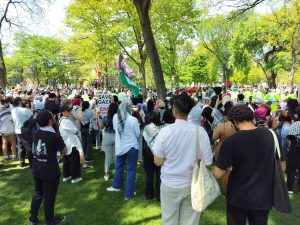On June 21, in Bangladesh, more than 50,000 working men and women mobilized on the outskirts of Dhaka, the capital. This mobilization, which blocked one of the main highways that connect the capital to the northern part of the country, was the culmination of two weeks of protests, strikes and street actions in the main industrial districts.
Ashula, home of the main factories of the powerful textile industry, was one of central focal points of the protests against the bosses of these real low-wage massive factories that produce for big brands like Zara, Carrefour, Wal-Mart and others. The nearly slave-labor working conditions, with workdays that range from 12 up to 18 hours daily, and hunger wages, exhausted the workers’ patience, which exploded in anger and mobilization. Almost without the participation of the National Garment Workers’ Federation, that limited itself to sending a memo about the harsh working conditions, the working men and women of the garment industry organized strikes and confronted the cops at the gates of the factories of groups like Ananta Group or Ha-Meen.
This industry, that employs around 4 million working men and women (40% of the industrial working class) pays miserable wages that reach 25 dollars monthly. But a large group does not even reach that extremely low sum: the wages of non-skilled male and female workers reach 11 dollars monthly, with luck! At the same time, in 2009 the textile sector represented 80% of the 15.560 billion dollars in exports from Bangladesh, that have big US and European brands as their main destination.
For businessmen, there’s a lot at risk, and for that reason, the employers’ association BGMEA complains and views with concern the recent wave of protests. In view of the first mobilizations, several factories shut their doors in hopes of stopping the contagious effect. However, the measure was counterproductive, causing bigger protests and the unification of the struggles in the streets, behind the same slogan, “Increase the minimum wage.” The problem is that hunger wages are the tip of the tragedy of growing inflation: during the past decade, the cost of living increased 94%, while wages only grew 24%.
The strikes and marches caused such concern that the Minister of Labor found himself forced to announce that the government would review the minimum wage, which several social and political organizations demand should reach 70 dollars.
The situation is unsustainable for millions of working-class families, in a context of widespread poverty (more than half of the people in Bangladesh live under the poverty line.)
In addition, the protests are taking place while tension between the government and the opposition Bangladesh Nationalist Party (BNP) is growing; the BNP is asking for early elections and called a strike on June 27, but without including the demand of the men and women textile workers for increased wages and better working conditions. This proves that both the ruling party and the opposition are in agreement on maintaining the structure of super-exploitation and miserable wages, in what is considered to be one of the countries with the lowest wages on the planet.
Lowering production costs: women and children first
70% of the world’s clothing is manufactured in countries like Bangladesh (also in Turkey and Morocco), where hunger wages are paid, and work proceeds for up to 18 hours daily. When the bosses talk about “advantage” and “competitiveness” and low “production costs,” guaranteed by the opportunities the capitalist countries offer them, with “legal security” and “flexible labor markets,” this is what they are talking about. This translates into aberrations like work without a contract, without health insurance or benefits, for the most exploited groups of the working class: women, young people, and, in many countries, boys and girls. In Bangladesh, as in other countries, 3 out of every 5 women work in the textile industry under subhuman conditions, going as far as working 24 hours in a row, to fill stock orders from the big brands. In India, 50 million boys and girls work in the textile industry. In many cases, these little workers earn less than a dollar a day (about 10 dollars a month).










